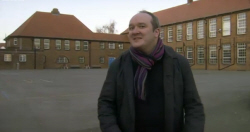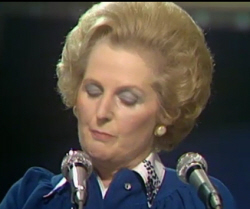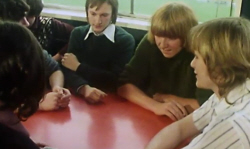Grange Hill
Comprehensive Schools

Grange Hill
No children's series of the 1970s provoked more indignation among adults, than Grange Hill, which hit the nation's screens in 1978.
This school was the original location for the serious. Tucker Jenkins and his mates ran riot in this very playground. And they had their punch-ups in this corridor.
The man who created Grange Hill, Phil Redmond, was a former comprehensive schoolboy himself. He'd written a series, he said, to give modern children
something to relate to, something that reflected the realities of school life. Realities that as he well knew, were often less than pleasant.
But that, of course, was the problem because the programme provoked a torrent of complaints from outraged parents, horrified by the hard-hitting realism
of scenes like this.

Tucker Jenkins
Letter "Dear Sirs, I have previously written to you on the vexed subject of Grange Hill. I can now see I find the new series equally as obnoxious as
before, but because of my dislike I watch extra carefully. I do not see why I should have to do listen to ill-mannered boys shouting their desire for
a pee all over my living room."
But the complaints about Grange Hill where about much more than decency and realism. The programme was so controversial because it had touched a raw
nerve among viewers who were already anxious and angry about the state of Britain's schools.

Margaret Thatcher
Ever since the 1960s, Britain had been switching to a comprehensive school system. At the time, comprehensives were hailed as a great improvement
on the old selection-based system, where the best went to grammar schools, and the rest to secondary moderns.
But by merging these two types of school, comprehensives were supposed to raise standards across the board.
The politician who'd approved more comprehensives than any other was the Conservative education Minister, Margaret Thatcher. Thanks to her by the
mid-70s, almost two thirds of children were being educated at comprehensives, including the pupils at her own former grammar school.
When Labour returned to power in 1974, they were determined to finish the job. They began by scrapping direct grants, a subsidy scheme that allowed
bright children to go to fee-paying grammar schools that their parents would not otherwise have been able to afford. Although fewer than 200 schools
were affected, the decision had a dramatic effect on public opinion.

Comprehensive School Boys
The switch to an entirely comprehensive system was now seen as a bad thing, depriving thousands of children of a grammar school education.
At the same time, the press claimed, comprehensive schools had been infiltrated by raving young Marxists, whose progressive teaching methods were
turning promising children into delinquents.
The furore over comprehensive education is often presented as a partisan dispute between left and right.
But it was actually more part of a culture war, fought out between two sets of middle-class parents, with completely opposite views about whether
schools should serve the community, or the individual.
On the one side, where those parents who were really keen to embrace the principle of social and academic diversity. And on the other, where those
who were desperate to see their children reach their full potential in a more selective environment.

Guardian Readers
And it was to the second group, parents who still saw grammar schools as a precious opportunity for upward mobility, that the new leader of the
opposition, Margaret Thatcher, began to speak. Conveniently forgetting her own record at the Department of Education.
Margaret Thatcher "We've got to stop destroying good schools in the name of equality. People from my sort of background needed grammar schools to
compete with children from privileged homes, like Shirley Williams and Anthony Wedgwood Benn."
I think that the same anxieties were at the root of the furious objections to Grange Hill, from some adult viewers. They were afraid that their
bright children might be dragged down by other peoples badly behaved kids.
The education debate was just one symptom of a consensus cracking apart. And just as the post-war settlement seem to be breaking up, so some people
were beginning to question the survival of the United Kingdom itself.




